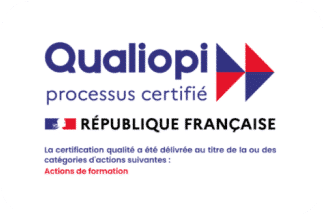Definition of e-assessment
Online or e-assessment is a process that gathers information about a learner’s level of learning before, during and after an online training course. The trainer must then interpret the results to assess the learner’s level and quantify the impact of the training. The necessary data is collected remotely using web and ICT tools. A growing number of software applications deployed in SaaS mode support this functionality and let users produce and analyze e-assessments.
Modern professional training assessments are based on the training evaluation model developed by Donald Kirkpatrick in 1959.
This American researcher defined 4 levels of evaluation: it would be unthinkable to design training assessment tools today without knowing which level is being evaluated.
• Level 1 concerns the learner’s’ reaction: what did they find relevant (or irrelevant) about the training?
• Level 2 concerns learning: how have participants improved their knowledge or skills? This can be assessed using a learning scorecard.
• Level 3 concerns the learners’ behavior: how have the learners changed their behavior in the light of the training.
• Level 4 concerns results: the results must be compared against the training goals.
A comprehensive professional training assessment should consider all four levels. These elements can be compiled in a training evaluation sheet. Various follow-up assessment templates are available to download from the Internet. Another option is to use training management software with ready-formatted assessment templates, which you can customize to suit your needs. These tools also let you automatically send these questionnaires to a group of trainees, and use targeted performance indicators to measure their progress.
Formative assessment: typical format for e-assessments
Unlike summative assessments, which certify learning achievements (via a formal qualification or certification), formative assessments aim to measure trainees’ progress towards particular learning goals.
Learners may be asked to perform various types of activities (see non-exhaustive list) for formative assessment purposes:
- Complete a questionnaire after performing a particular task (e.g. reading a document).
- Ask learners to summarize what they have learned during the training;
- Ask learners to explain to their coworkers what they have understood about the training content;
- Answer questionnaires with single-choice (true or false) questions;
Follow-up evaluation of training courses
Software tools are a good choice for follow-up assessments of professional training. Training management software solutions can be used to create follow-up assessments and automatically send them to trainees 3 to 6 months after the start of the training.

